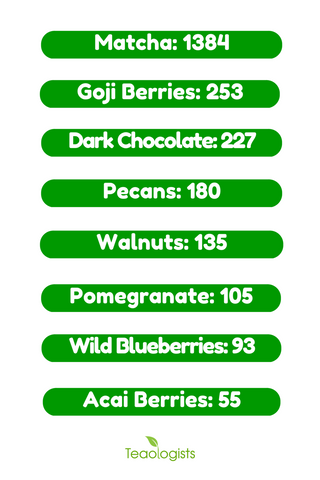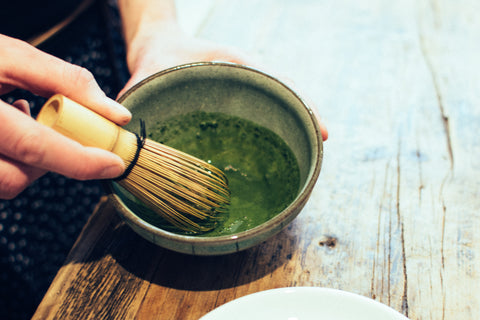Over the past few years, we have all gone crazy about matcha tea.
Everywhere you look, people are drinking it. Not only this, matcha is turning up in everything from cakes to ice creams, from lattes to doughnuts. There's even a matcha face mask!
But what was it that made us mad about matcha? It's just ground up green tea right? Wrong!...

Oh, yes. You’ve probably heard a lot about the innumerable health benefits of matcha. But is it really as healthful as they say? We did some digging and came up with some info that we’ve shared here with you.
No. In fact, it’s anything but new. Matcha tea is ancient. It has been around for centuries. 800 years ago, it made its way to Japan, where it became a cultural phenomenon which would last for centuries. 800 years later, in the modern world, it’s successfully making its presence felt in the western world and is quickly becoming the drink of choice. Anyone who is even remotely concerned about maintaining a healthy diet and lifestyle has taken an interest in matcha. And with obesity, cancer and cardiovascular diseases spreading like epidemics, matcha seems like a modern day miracle.
We’ll get right to answering that, but first, let’s examine how much healthier matcha is over regular green tea (teabag). Here’s a comparison between matcha and regular green tea:

To get the most out of your matcha, it’s imperative to buy the right quality. High quality matcha is not easy to come by. Even in Japan, the only country in the whole world where matcha is grown, there are only a few elite tea farmers who have the know-how to produce high quality matcha. You might want to check out our blog on how to choose genuine matcha where we have discussed the matcha production process in detail.
The quality of matcha also largely depends on how it is stored. When storing matcha, always to use an airtight container and try not to keep matcha beyond 2 months as air degrades it.
According to American Cancer Society spokesperson and nutritionist Rachel Beller, just 1/4 – 1/2 teaspoon is equal to 8-10 cups of regular green tea in terms of antioxidant content. Among the antioxidants, there are catechins named epigallocatechin 3-O-gallate (EGCG) in matcha. These are known to reduce irregular cell growth. According to a study, the EGCG in matcha is 3 times more concentrated than that of regular green tea and up to 137 times more potent. The EGCG has the ability to suppress the growth of cancerous tumors and even atherosclerosis (blocking of the heart arteries due to fat deposit on their inner walls).
The EGCGs are the properties that reduce the risk of cancer, cardiovascular diseases, obesity, diabetes, and fight against bacteria, viral and fungal infection. They stop the spreading of infections by suppressing the macrophage migration in the keratinocytes.
EGCGs are known to have an immediate positive effect on the cognitive behaviour, reducing the chances of developing Alzheimer’s.

The EGCGs provide other health benefits like:
EGCGs are awesome and matcha is the ultimate healthy beverage.
Matcha tea is a superfood. It’s rich with all the benefits of green tea in a concentrated form. We’re talking serious stuff such as cancer-fighting, heart disease-averting and type-2 diabetes–preventing properties. This tea takes health benefits to the next level.
But be careful not to go overboard with sugar and cream and other tasty stuff for your matcha. After all, what good are matcha health benefits if they are eroded by sugar, artificial flavourings and other things that are just there to make your drink/food look good?
The chlorophyll content in matcha is quite high due to the shade-growing process. Chlorophyll provides an oxygen boost, protects against radiation, aids in healing and helps detoxify.
1 cup of matcha contains significantly more antioxidants than Goji berries, broccoli, chlorella or spirulina. ORAC stands for Oxygen Radical Absorbance Capacity. It is a way of measuring the capacity of antioxidants in units per gram. Higher ORAC value signifies higher antioxidant content. Matcha tea has one of the highest ORAC ratings of any food or drink ever measured. To give you an idea, here’s a comparison of the ORAC value of matcha and the most antioxidant-rich foods on the planet.

Matcha is rich with vitamin A, vitamin B-complex, vitamin C, Vitamin E, vitamin K and some trace minerals. Matcha is an amazing source of healthful amino acids such as L-theanine and theophylline. There’s hardly anything else on the planet that has so much nutritional value as matcha tea.
Despite being considered an overall safe beverage, the National Institutes of Health (NIH) state that it can cause constipation and stomach upset at times. The NIH recommends drinking no more than 5 cups of green tea in a day. According to them, any drink that contains caffeine may trigger side effects like insomnia, heartburn, headache and diarrhea. It’s fortunate therefore that matcha tea has just half the caffeine of coffee.
Quality should be your biggest concern when buying matcha. If you intend to experience all the health benefits of matcha tea, Always choose carefully grown matcha, which can reflect in its price. Matcha teas that are priced cheaply are often of poor quality and therefore, lack the health benefits.
If you intend to consume matcha for health, keep in mind that matcha is not something that can be recommended as a substitute for medications and medical treatment. However, it is possible that regularly drinking matcha can help prevent many health problems and improve your overall health but if your goal is to combat a particular ailment, the best course of action is consulting your physician. Trying to self-treat can lead to severe consequences.

The American food and entertainment magazine Bon Appétit refers to matcha as a versatile ingredient that can be used in hot, cold, savoury and other types of preparations. Since matcha is powdered, it’s extremely flexible. Here are a few ways to use it, but these are not all. There’s a lot more that can be done with matcha.
With juices and other beverages
Add 1 tsp to the juice/beverage
With breakfast
Sprinkle some matcha on your porridge, cereal or chia pudding.
With salads
Sprinkle a pinch of matcha over your salad
With soups
Add 1 tsp of matcha into the soup
With dips
Sprinkle a little bit of matcha on dips
With omelette
When you add spices to your omelette, sprinkle some matcha too
With yoghurt
Sprinkle some on your yoghurt
With stir-fried vegetables
Add matcha with other spices when you stir-fry vegetables. The flavour will be awesome.
With coffee
Coffee tastes stronger with a dash of matcha tea in it (what an irony!)
With guacamole
If you have a thing for Mexican food, you probably make guacamole at home. Add some matcha into it to give a fresh twist to this classic Mexican dish.
With frozen treats
You can make matcha sorbet, popsicles, and even play around with ice cubes to make them flavoured and/or coloured.

That would be amino acids. The amino acids in matcha give them what’s known as “Umami” or the fifth taste. The signature creamy, full-bodied flavour is due to the presence of L-Theanine and other amino acids.
Comments will be approved before showing up.
mildred CROTHERS
September 21, 2017
The soil naturally possesses contaminants such as fluoride, pesticides and heavy metals. Are these contaminants removed from the Matcha leaf?